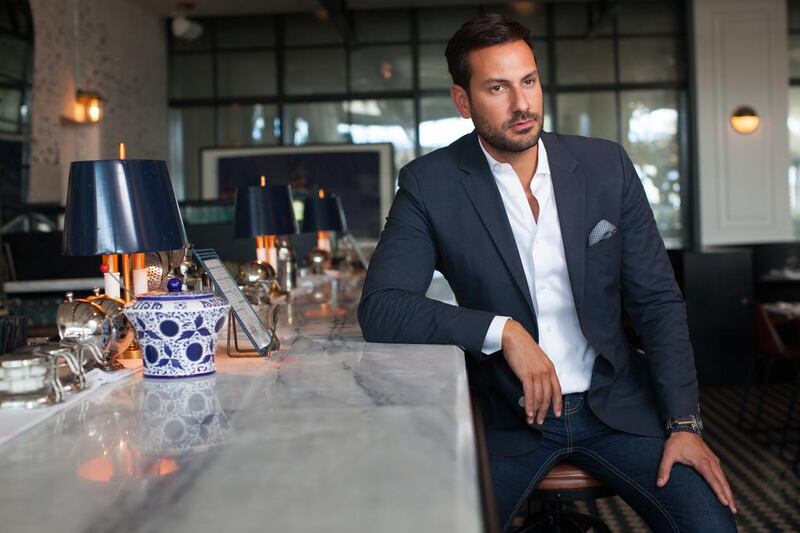For Joey Ghazal, the decision to move to the UAE and set up an oyster bar in JBR came with a bang.
The 37-year-old Lebanese-Canadian was running a group of four chic eateries in Beirut in 2013 when a bomb exploded outside his office.
“That was really the straw that broke the camel’s back,” Mr Ghazal says sitting in the recently opened 6,000 square feet urban chic brasserie. “It was a year into the Syrian war and the situation was deteriorating. To have a political assassination so close by was a shock for me. It was a hard market for financial planning.”
Having spent part of his childhood in Dubai before moving to Montreal in Canada, Mr Ghazal decided to up sticks and set up all over again in a new city.
“It was a tough decision for me,” he says, sitting in a booth in his new concept, the Maine Oyster Bar & Grill and tucking into a plate of crab ceviche. “The businesses were all doing well, I had the teams in place to run things. It was steady.”
Determined not to rush into anything, Mr Ghazal spent the next year-and-a-half studying the Dubai restaurant scene looking for the right opportunity.
For Mr Ghazal, finding the right building to open a new restaurant was key – he needed something which would work well as a restaurant, with good views, easily accessible, linked to a hotel and where the rent would be affordable for a small start up business.
Eventually, after many false starts, his search led him to the loading bay of the Doubletree Hilton, a building originally intended to be the hotel’s gymnasium.
“They showed me round and basically said is there anything you can do with this,” Mr Ghazal says. “I immediately loved the space. I love the way you walk from the loading bay and it’s a little bit urban and you think what have I let myself in for and then you come through the doors and you’re in this beautiful location with lots of light and the view of the ocean.”
Perhaps more importantly for a small business, the unusual location meant that the hotel was prepared to offer what Mr Ghazal describes as “a reasonable rent and a good rent-free period”.
“There were times when I did worry,” Mr Ghazal says. “I thought will anyone even find it here?”
From finding the space in March 2014, it took Mr Ghazal until November 2014 to set up a Dubai business and sign the lease on the property. And from then it took him a further year before he was ready to open on November 23, 2015.
“Opening a new restaurant is challenging to do anywhere not just Dubai,” Mr Ghazal says. “There are a lot of regulations in Dubai, as there should be, but I was coming from Beirut where things are a lot looser. It was very different from Lebanon.”
Having grown up in Dubai, Mr Ghazal says he already had a good network of family and friends to help him with the day-to-day difficulties of setting up a business in the city – finding a local partner and investors, getting the right permits, locating staff accommodation and processing visas. His contacts enabled him to find investors to help foot the bill for the start up meaning that the business did not have to take out bank loans.
To Mr Ghazal, the seafront location and high ceilings lent themselves perfectly to a North American-style seafood bistro, and spurred on by the lack of independent, affordable licensed restaurants in Dubai, he set about realising his dream.
“When I looked at the Dubai market I found that the Dh275 to Dh350 per head category was largely unexplored,” he says. “There is a huge opportunity for licensed premises independent of hotels at that price point.”
The problem, Mr Ghazal says, is that most of the suitable restaurant locations are linked to hotels, and hotels are generally built to suit the needs of the large hospitality groups that operate them rather than to cater for the needs of small start-up restaurants.
The regulations and costs surrounding employing the restaurant’s 40 staff has also caused further headaches for the business Mr Ghazal says. These include the need to fly staff in from around the world, to find them accommodation in Dubai, to take care of their medical insurance, visas and flight tickets home.
“When you add these things up they are a huge cost,” Mr Ghazal says. “You really have to ask questions first to find out how much it is going to cost you and make sure you don’t under- budget. You’ve got to know these things way before you even get to write out a business plan.”
Recruitment too is what the restaurateur describes as a “big challenge”, with many staff coming through referrals from friends but others coming through agencies.
But despite the difficulties, Mr Ghazal says he is open to going through the whole process again and is potentially casting around for ideas to open a second restaurant in the UAE, either in Dubai or elsewhere in the Emirates.
“Opening restaurants is what I do,” he says. “I have been in the restaurant business for 20 years. It makes use of the left and the right sides of the brain, so you have to not only be into cooking and coming up with a concept but also real estate, marketing, accounting, managing people. It’s what I love.”
lbarnard@thenational.ae
Follow The National's Business section on Twitter





